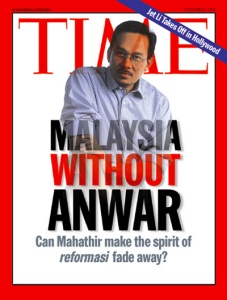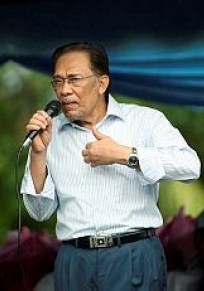October 22, 2015
Vision 2020 marred by scandals, corruption and abuse of power
by Dr. Lee Hwok-Aun
Financial scandals, public protests against corruption and authoritarianism, economic anxiety and a depreciating currency are factors that would threaten the position of any elected national leader. Not in Malaysia.
 Faced with the above, Dato’ Seri Najib Razak has maintained his grip on the prime ministership. But with his credibility damaged, public trust shattered, and his signature 1Malaysia concept buried, his policy record increasingly hinges on fulfilling transformation.
Faced with the above, Dato’ Seri Najib Razak has maintained his grip on the prime ministership. But with his credibility damaged, public trust shattered, and his signature 1Malaysia concept buried, his policy record increasingly hinges on fulfilling transformation.
The Global Transformation Forum, running in Kuala Lumpur October 21-23, will showcase Malaysia’s new policy making and monitoring model, and perhaps cast a warm glow on the administration.
Malaysia’s economic and government transformation programs are driven by Dato’ Idris Jala, Najib’s cabinet appointee and CEO of the performance management and delivery unit, and chief proponent of the “Big Fast Results” method for undertaking such endeavours.
The Prime Minister’s continued blessing for such programs has been returned with loyalty, such that even the crafting of political funding reform was entrusted to Idris and Paul Low, the Minister of Governance and Integrity.
Notably as well, Najib withdrew from launching a major global anti-corruption conference in August, but delivered the opening address of this forum. How far can the programs transform Malaysia and preserve the power of the ruling Barisan Nasional coalition? The regime counts on two important balances tipping in its favor: short-term gains outweighing long-term goals and service delivery overshadowing government integrity.
Malaysia’s policy horizon is short, by destiny and by choice. Less than five years remain until the nation’s day of reckoning with Vision 2020, a grand mission launched in 1991 by then Prime Minister Tun Dr Mahathir Mohamad.
Come 2020, Malaysia is supposed to already be a fully developed nation, attaining high income, capability and technology, and fostering a democratic, liberal, progressive and innovative society.
But in reality, reaching these lofty goals will take a longer time, beyond 2020. With Malaysia’s economy continuing to grow faster than the high-income entry bar, it will join the club, although when is uncertain.
Achieving that target will also yield political returns. It is a distinct and quantifiable accomplishment. Continual public spending of growth dividends on the lower-income population does provide some help in times of economic stress, while shoring up electoral support.
Short-term bias is accentuated by design; Malaysia’s transformation model favors programs that generate big fast results and filters out those that do not.The selection process is disinclined toward initiatives that require long and slow gestations, although a number of such projects will make it through.
 On the one hand, commitment to short-term fixes is spirited, such as the implementation of Bantuan Rakyat 1 Malaysia — or better known as BR1M — a program of massive cash transfers to lower-income families. On the other hand, the government is lukewarm in its pursuit of systemic, broad-based innovation and sociopolitical maturation.
On the one hand, commitment to short-term fixes is spirited, such as the implementation of Bantuan Rakyat 1 Malaysia — or better known as BR1M — a program of massive cash transfers to lower-income families. On the other hand, the government is lukewarm in its pursuit of systemic, broad-based innovation and sociopolitical maturation.
This trumping of immediate, quantifiable targets over gradual, qualitative progress is particularly stark in the education system, which is vital for sustaining socioeconomic advancement over the long term.
In schools and universities, learning outcomes and performance targets are spelled out while resources and personnel are constrained by standardization and audit requirements. Inquisitiveness, creativity and critical thinking remain barely encouraged. International recognition of this model revolves around its methods more than its contents.
PEMANDU has instituted a streamlined mechanism for consultative policy formulation, detailed planning, internal monitoring and performance assessments. The methodology has clearly spurred heated discussion and generated novel programs.
But far-reaching transformation entails major structural change, even disruptive contents and breakpoints. Leadership change often precedes transformational change, and there must be substantial cohesion between messenger and message, between the authority and the agenda.
Malaysia’s transformation is now being executed by a scandal-tainted Prime Minister heading a controlling and change-resistant establishment — the Barisan Nasional coalition that has held power for almost sixty years.
Governments the world over gain legitimacy and placate discontent by providing material goods and managing economic affairs. But in Najib’s case, the onus on government service delivery to scrub away doubts about his personal integrity is particularly high.
Transformation halts at pivotal points. From the political funding reform dialogue so far, it seems the US$700 million deposited into the Prime Minister’s personal account has already been exonerated as a “donation.”
Transformation into a more responsive government requires consultation in policy formulation and regular self-reporting of performance outcomes. But Najib’s government remains decidedly opposed to freer and fairer elections, accountability of the executive to parliament, rule of law, and freedom of information.
To be fair, these bigger issues lie beyond PEMANDU’s ambit; its programs specifically address economic and government transformation. But the exclusion of political transformation is precisely the problem from a national standpoint.
As technocratic as PEMANDU may be, the enduring impact of its programs lies in the hands of Malaysia’s untransformed political masters. – Nikkei Asian Review, October 22, 2015.
* Dr.Hwok-Aun Lee is a senior lecturer in development studies at the University of Malaya.






